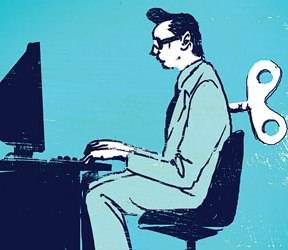October 18, 2016
Stress and overwork in the City of London remains endemic, finds research 0
 The financial services industry has never been known as a ‘touchy-feeling’ environment, and despite efforts to raise the issue of mental ill health at work, appears resolutely resistant to cultural change. This perception is reinforced by a new piece of research which claims that rising stress in the City is driving more than two out of three investment bank staff to consider quitting their job – but employees believe talking about stress or mental health issues to management will damage their careers. In a study by MetLife among decision makers at financial institutions two out of five (40 percent) think their job is extremely stressful with 67 percent considering quitting their jobs in the next year if stress levels do not improve. However, despite the impact of stress on their work and home lives, around 70 percent believe that admitting to suffering from anxiety or mental health issues will damage their career prospects and there is a reluctance to offer staff more flexible hours to help reduce the strain.
The financial services industry has never been known as a ‘touchy-feeling’ environment, and despite efforts to raise the issue of mental ill health at work, appears resolutely resistant to cultural change. This perception is reinforced by a new piece of research which claims that rising stress in the City is driving more than two out of three investment bank staff to consider quitting their job – but employees believe talking about stress or mental health issues to management will damage their careers. In a study by MetLife among decision makers at financial institutions two out of five (40 percent) think their job is extremely stressful with 67 percent considering quitting their jobs in the next year if stress levels do not improve. However, despite the impact of stress on their work and home lives, around 70 percent believe that admitting to suffering from anxiety or mental health issues will damage their career prospects and there is a reluctance to offer staff more flexible hours to help reduce the strain.









 Giving employees more control over workplace design is the single most important contributing factor to their wellbeing, according to a new study. The Workplace & Wellbeing report examines the workplace design factors that influence wellbeing. The research team discovered that an invitation to participate in the design of the work environment raised levels of wellbeing, although increasing the level of participation did not necessarily increase the level of wellbeing. The research was led by the Royal College of Art’s Helen Hamlyn Centre for Design in partnership with architects Gensler and supported by a consortium of leading industry names: Milliken, Bupa, Royal Bank of Scotland, Kinnarps and Shell. The context for this project lies with a current ‘wellbeing deficit’ in the workplace which means absence from work costs the UK economy more than £14 billion a year according to the Confederation of British Industry.
Giving employees more control over workplace design is the single most important contributing factor to their wellbeing, according to a new study. The Workplace & Wellbeing report examines the workplace design factors that influence wellbeing. The research team discovered that an invitation to participate in the design of the work environment raised levels of wellbeing, although increasing the level of participation did not necessarily increase the level of wellbeing. The research was led by the Royal College of Art’s Helen Hamlyn Centre for Design in partnership with architects Gensler and supported by a consortium of leading industry names: Milliken, Bupa, Royal Bank of Scotland, Kinnarps and Shell. The context for this project lies with a current ‘wellbeing deficit’ in the workplace which means absence from work costs the UK economy more than £14 billion a year according to the Confederation of British Industry.
 There is no doubt that the UK’s office based knowledge industry is facing a crisis in the form of a ‘wellbeing deficit’. Both the Confederation of British Industry (CBI) and Health and Safety Executive (HSE) have reported record levels of absenteeism, with the latter attributing 23.3 million lost working days to work-related ill-health, such as depression, stress, anxiety and musculoskeletal disorders. A great deal is already known about the causes of the key issues of employee stress and demotivation, but more work needs to be done to establish how organisations can meet their corporate goals with regard to these issues, whilst still engaging, motivating and nurturing their workforce. A significant body of published research has identified that a sense of ‘personal control’ can have a hugely positive impact on employee wellbeing, but how can we engender that control when it comes to creating a productive working environment?
There is no doubt that the UK’s office based knowledge industry is facing a crisis in the form of a ‘wellbeing deficit’. Both the Confederation of British Industry (CBI) and Health and Safety Executive (HSE) have reported record levels of absenteeism, with the latter attributing 23.3 million lost working days to work-related ill-health, such as depression, stress, anxiety and musculoskeletal disorders. A great deal is already known about the causes of the key issues of employee stress and demotivation, but more work needs to be done to establish how organisations can meet their corporate goals with regard to these issues, whilst still engaging, motivating and nurturing their workforce. A significant body of published research has identified that a sense of ‘personal control’ can have a hugely positive impact on employee wellbeing, but how can we engender that control when it comes to creating a productive working environment?












October 19, 2016
Where are zero hours contracts and the gig economy taking us? 0
by Mike James • Comment, Flexible working
(more…)